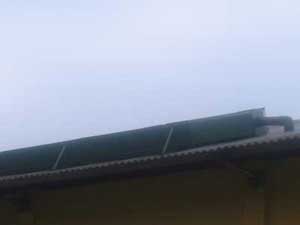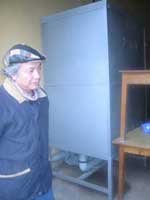Experts from Vietnam National University of Agriculture (Hanoi) have successfully developed a solar-powered drying machine for agricultural products.
 |
|
The heat-collecting unit is installed on the roof of the Vietnam National University of Agriculture. Hot air flows into the drying chamber through the pipe on the right. |
This machine can dry rice, corn, beans, peanuts, coffee, onions, garlic, and more.
Associate Professor Bui Hai Trieu, the project leader, stated that the machine has been used to dry rice experimentally on sunny days during this year’s winter, when the outdoor temperature was 19-20 degrees Celsius.
Under these conditions, the air in the drying chamber reached 50 degrees Celsius, with each drying batch lasting 8-10 hours.
This drying machine consists of two main components: the heat-collecting unit and the heat exchange chamber.
The heat-collecting unit includes a thin sheet metal, painted black to absorb heat from sunlight. Above the sheet metal is a transparent glass panel that traps thermal radiation. This unit can be installed on rooftops.
 |
|
Associate Professor Bui Hai Trieu stands next to the drying chamber. |
The current prototype can dry 450 kilograms per batch, and it can be built to handle 4.5 tons per batch, depending on the needs of each farmer. As it does not require advanced technology, farmers can assemble the machine using easily accessible materials such as wood, metal, sheet metal, and glass.
The research team plans to continue improving the machine by utilizing heat from biogas to enable drying at night or during rainy weather, meeting the intensive drying demands during the harvest season.
One of the enhancement directions includes equipping the machine with a controller to regulate the temperature in the drying chamber suitable for different types of agricultural products.
Professor Trieu added that since the research and development process has just concluded, the cost of the machine has not yet been estimated. However, if the machine is applied in practice, the cost could be acceptable for the current income of farmers.
Minh Son
















































